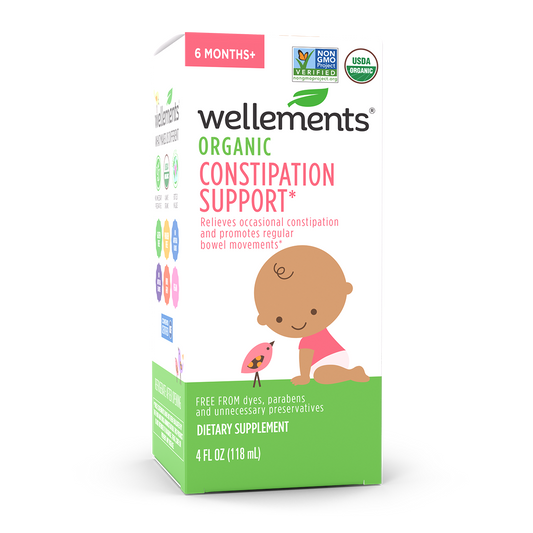The Scoop on Poop – What’s Normal and What’s Not!
| updated:Share

From the time your baby is born, doctors, nurses and parents alike are all very focused on their stools – or as I prefer to call it, poop. You will likely become fixated on poop as well, and your healthcare provider will likely ask about it at every well check. Here’s what you can expect.
Baby Poop
When your newborn arrives out of the womb and into the world, they will have their first black tar-like poop called meconium. Then, their poop transitions to a thin green substance and eventually becomes mustard yellow, maybe brown, or even green again here and there. This poop is often seedy and even can have liquid like-liquid consistency. Normal pooping indicates milk is correctly moving through the digestive tract providing the nutritional support needed to grow – this is a great sign!
In the first few weeks of life, it’s not uncommon for babies to have 10 to 12 bowel movements a day, especially if they are drinking only breastmilk. Formula-fed babies on average have 3 to 4 bowel movements a day. The number of bowel movements can vary across the board for both types of milk. As long as your baby is feeling and feeding well and pooping comfortably, there’s nothing to worry about. It also is not uncommon for breast-fed babies to skip days without a poop. In fact, some babies will go a week or even longer without a bowel movement. This often occurs when they are going through a growth spurt. The body uses all that milk to grow. (My breast-fed son went poop every four days, on average, after his first month of life until he started solids).
With formula-fed babies, or even those who have a combination of formula and breast milk, sometimes the frequency of bowel movements can change from several to once a day or even every other day. Again, as long as they are feeling well and comfortable, you don’t need to worry. Of course, if you are, call your healthcare provider. In my medical practice, parents commonly call with this concern.
Constipation
With both breast and formula-fed babies, once solids are introduced, the number of bowel movements will decrease (and boy are they stinky!). With this transition to a solid diet, it is not uncommon for babies to develop constipation.
Constipation in babies is defined as painful passage of bowel movements, which can be large or small, often dehydrated and hard. Most often, these bowl movements require excessive and uncomfortable straining in order to push them out. If constipation occurs with solids, Wellements offers an impressive and effective product called Organic Baby Move. Just like all of their products, Baby Move is certified organic and preservative-free. It is also Non-GMO Project Verified, gluten-free, vegan and kosher. It is impressive, not only because it contains an organic prune concentrate, but because it also has an organic prebiotic fiber known as chicory root. It’s indicated for babies six months and older.
4.3 /
5.0
(36)
36
total reviews
Constipation Support
Sale price
$12.49
Another option for constipation would be plain fruit juice such as prune, pear or apple. Giving two ounces, twice daily until the stools are loose is a good rule of thumb. Also, starting with solid foods containing more fiber such as peas, prunes or pears helps, too. Glycerin suppositories or rectal stimulation with a lubricated rectal thermometer (Vaseline, KY Jelly) can be occasionally used, too. It’s best to have your healthcare provider properly demonstrate how to utilize these techniques.
The transition to solid foods is one of the most common causes of constipation in babies. However, there can be other causes as well. For instance, babies consuming formula prior to the introduction of solids, often times have trouble digesting the formula’s protein, which can lead to constipation. With this, a formula change to an easier-to-digest protein product typically helps to resolve the issue. Other medical conditions such as an under-active thyroid (congenital hypothyroidism) can lead to constipation. Another example is a congenital condition known as Hirschsprung’s disease. With this disorder, the nerves in part of the gastrointestinal tract are malformed, thereby affecting proper bowel momentum and function. If constipation persists, we always recommend contacting your healthcare provider!
In conclusion, poop is an important indicator of overall health from the time your child is born. It should remain soft and easy to push out. If your babies poop frequency changes, don’t be alarmed! As long as they are comfortable, feeding well and urinating normally, there is nothing to worry about. If they experience discomfort, become constipated, or you are simply looking for peace of mind after noticing a change in their poop, consult your healthcare provider. That’s what we are here for! We are part of your village, after all.



